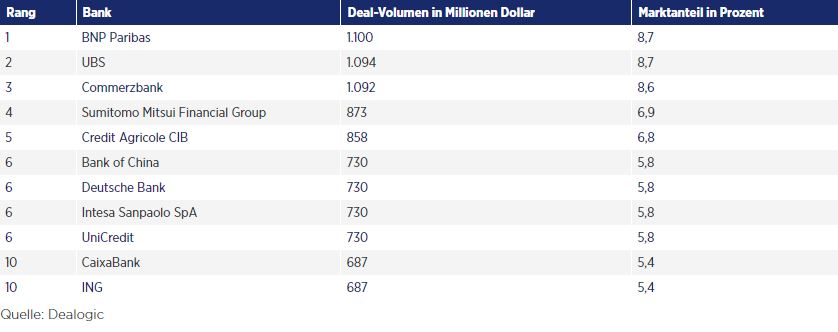Interview of Enna Pariset in Handelszeitung
Original article by Holger Alich published in Handelszeitung
This Woman Aims to Challenge UBS
Enna Pariset heads the Swiss subsidiary of the French banking giant, focusing squarely on Swiss clients—including in private banking.

Enna Pariset is an extraordinary woman, notable not only for her role at the helm of a bank—BNP Paribas’ Swiss subsidiary—as one of the few women in such a position, but also for her dynamic personality, which makes even Sergio Ermotti of Ticino seem reserved by comparison.
What’s even more remarkable is her vision for the Swiss branch of the Eurozone’s largest bank. Although BNP Paribas has been active in Switzerland since 1872 and was even involved in financing the Gotthard Tunnel, its presence in the Swiss market has been relatively minimal for many years. Pariset plans to change that fundamentally. “We are not a French bank; we are a Swiss bank that is part of a global group,” she declares.
The Offensive in Swiss Private Banking
Pariset is not only focusing on corporate banking—BNP Paribas’ traditional strength—but also targeting private banking. “My goal is for the Swiss market segment in our wealth management to grow so significantly that it becomes the largest revenue generator,” she states.
Currently, BNP Paribas’ Swiss operation manages 27 billion Swiss francs in client assets, with about 10 billion of that coming from Swiss clients. The rest stems from traditional offshore business with clients from the Middle East, Germany, France, and Italy.
Unlike most foreign players in wealth management who primarily cater to international clients, Pariset sees significant growth opportunities in the Swiss market, particularly in conjunction with the firm’s corporate banking business. BNP Paribas aims to attract top managers and business owners. “I believe the business model of those banks that only offer asset management will come under increasing pressure,” says the BNP Paribas banker.
1300 Employees in Switzerland
To bolster her ambitions in Swiss private banking, Pariset recruited help from UBS, hiring Beat Bachmann, who has been leading Swiss wealth management at BNP Paribas since August 2022. Overall, 260 people work in this division.
While Pariset did not partake in the mass recruitment from Credit Suisse, she does not endorse poaching entire teams, as it risks diluting the firm’s corporate culture. Nevertheless, twelve individuals from Credit Suisse have joined BNP Paribas Switzerland.
Pariset has been leading the Swiss branch of the French bank since July 2023. Across all areas, the bank employs 1300 people in Switzerland. Its parent company is the largest bank in the Eurozone by balance sheet, employing 183,000 people across 63 countries.
Pariset, a seasoned investment banker, spent most of her career with the French financial giant. After earning an MBA from Lehigh University in Pennsylvania, she joined the World Bank in 1994. Three years later, she moved to JP Morgan’s investment banking division. In 2004, she began her stint at BNP Paribas in London, where she was responsible for investment banking in commodities and metals.
In Switzerland, financing commodity trade has long been one of the French bank’s strengths—until 2014, when the U.S. fined BNP Paribas a record $8.9 billion for violating sanctions with countries like Iran and Sudan. The Geneva branch was also reprimanded by FINMA.
Financial Strains
Following these events, the Paris headquarters discontinued its commodity business, a decision still impacting the Swiss branch’s finances: In 2022, the Swiss bank reported a loss of nearly 58 million Swiss francs as it continues to clear legacy issues, which incurs costs. Additionally, in 2019, a cost-cutting program was initiated to centralize certain back-office functions at a group level.
“The balance sheet of our Swiss bank only reflects a portion of our business here,” Pariset explains, noting that their business with Swiss clients is profitable overall, though specific figures were not disclosed.
Besides wealth management, Pariset emphasizes corporate banking, having already shifted focus to Swiss corporate clients before the Credit Suisse crash. The target clients are companies generating over 200 million Swiss francs in annual revenue. Thirty employees manage 1500 Swiss corporate clients.
“A corporate loan is not necessarily the entry product,” notes Pariset. “Some customer relationships, for example, started with us taking over cash management.”
With the restructuring of Credit Suisse, Pariset doesn’t foresee a credit squeeze for corporate clients. However, she expects that the new UBS might scale back some customer engagements to avoid excessive risk concentration, presenting opportunities. In the first quarter, BNP Paribas ranked first in syndicated loans, although these league tables are highly volatile; the bank was sixth in the previous quarter.
BNP Paribas ahead of UBS

Pariset views the size of the parent bank as a competitive advantage—from mergers and acquisitions to financing foreign trade, currency management, and capital market transactions, BNP Paribas offers a comprehensive range of services. “Among the foreign banks operating in Switzerland, BNP Paribas certainly has one of the greatest potentials here,” comments a CEO of a prominent Swiss industrial company who has dealings with several banks but has not yet done business with BNP Paribas. Thanks to its strong capital base, the bank has ample capacity for loans and can also offer its clients a global payment infrastructure.
Determined to fill the gap left by the dissolution of Credit Suisse, the Paris headquarters has set a target for the Swiss subsidiary to increase revenue by 9% annually between 2021 and 2025. “We have already reached this target in investment banking by the end of 2022, which led to our revenue goal being increased by 100 million,” Pariset reveals. The race to challenge the market leader UBS has truly begun.